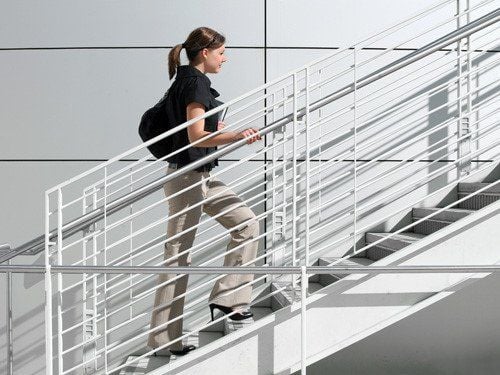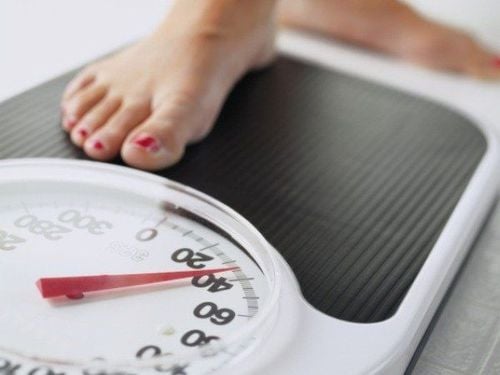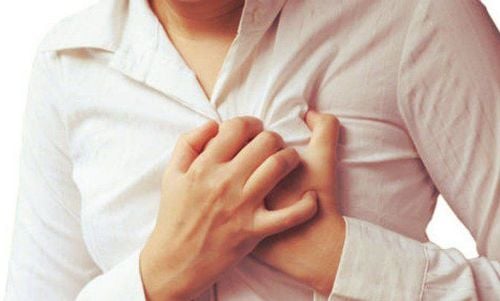This is an automatically translated article.
The article was professionally consulted with Master, Doctor Nguyen Minh Son - Interventional Cardiologist - Department of Medical Examination & Internal Medicine - Vinmec Nha Trang International General Hospital.Climbing stairs requires a significant amount of force on the knees, so if climbing stairs is a regular form of exercise, you should do it carefully and take good care of your joints after each workout. .
1. Can climbing stairs check heart health?
When climbing stairs, the heart beats faster, because it has to work continuously to supply blood to the organs that are having to work and expend energy. The shortness of breath accompanied by a sharp pain in the heart can be a sign of a problem with the heart's ability to supply blood to the heart, which is common in coronary heart disease.Many studies show that people who can climb 4 consecutive flights of stairs in less than 1 minute have good cardiovascular health. Conversely, if it takes you more than 1 minute 30 seconds to climb 4 flights of stairs, it is a warning sign of cardiovascular disease. Stair climbing is also used to measure the success of a surgery, being able to climb 1-2 flights of stairs is a sign that their surgery will go relatively well.
One study compared the results of a stair-climbing test with a laboratory exercise test. Of these, 165 participants were assigned to run on a treadmill until exhaustion and then measure their metabolic rate (MET); After resting, the group moved on to climbing 4 sets of stairs (60 steps) at a brisk pace but did not run and measured the MET again.
Results showed that those who climbed 4 flights of stairs in less than 40 to 45 seconds achieved more than 9 - 10 METs, those who took 1.5 minutes or so achieved less than 8 METs. Whereas an earlier study has shown an association between mortality and MET, achieving 10 MET is associated with lower mortality (less than or equal to 1% per year, or 10% over 10 years). ), less than 8 MET, the mortality rate is higher (2 - 4% per year, or 30% over 10 years).
According to the same study, 58% of participants who took more than 1.5 minutes to climb the stairs had abnormal heart function, that figure was 32% for those who climbed the stairs for less than 1 minute. 32%, equivalent to 1 in 3 people who did a good job climbing the stairs, had abnormal heart function (a marker of coronary heart disease). This shows that stair climbing cannot be viewed as a comprehensive assessment, but only a rough assessment of a person's physical condition and cardiovascular health.
Echocardiogram or electrocardiogram can help detect heart problems that the stair climbing test cannot do. Therefore, a comprehensive examination through disease symptoms and paraclinical tests is of great significance in checking cardiovascular health.

Khi leo cầu thang tim đập nhanh, vì nó phải hoạt động liên tục
2. Pros and cons of stair climbing in cardiovascular health assessment
The great advantage of stair climbing in cardiovascular health measurement can be performed almost anywhere with very little equipment or manpower requirements. It is also much cheaper and faster than traditional tests and can be repeated many times to monitor any progress or change in mobility.However, the downside is that the test is not standardized, the type of stairs, the rate of climbing stairs, the different timelines give different assessments. It is also significantly limited in the evaluation of patients with limited mobility and elderly patients.
3. Who should not climb stairs?
Some people should avoid climbing stairs to exercise as a regular form of exercise, they are:Elderly People with diabetes, acute heart disease, respiratory failure People with injury or osteoarthritis Pregnant women Climbing stairs heart palpitations are good for the heart. However, you should do it carefully and take good care of your joints after each training session to ensure safety as well as overall health.
Follow Vinmec International General Hospital website to get more health, nutrition and beauty information to protect the health of yourself and your loved ones in your family.
Please dial HOTLINE for more information or register for an appointment HERE. Download MyVinmec app to make appointments faster and to manage your bookings easily.
References: healthline.com, health.harvard.edu













